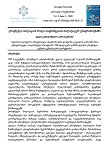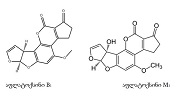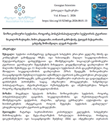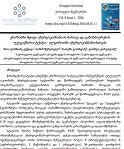SOME SOCIAL ASPECTS OF ANTIBIOTIC USE IN GEORGIA
Downloads
Background: One of the most urgent problems of modern medicine is the tendency of increasing resistance to antibiotics. Which to a certain extent was caused by inappropriate use of antibiotics.
Objectives:The aim of the study was to study the social aspects of antibiotic use in Georgia.
Methods:To study the social aspects of the use of antibacterial drugs, we used a semi-structured open questionnaire, which made it possible to conduct a survey with the respondents in a dialogue mode.
All persons participating in the study were adults, living in the capital of Georgia, with higher education, including 25 patients / 6 financiers, 4 teachers, 5 marketers, 3 accountants, 2 economists, 5 housewives/, 25 family doctors and 25 pharmacists.
Conclusions:Antibiotic therapy in Georgia is influenced by a number of social aspects. The following trends were revealed: in some cases, patients start self-medication with antibiotics, because they assess the need for antibiotics based on their complaints, they do not consult a doctor to save time and financial resources. Specific pharmacies are selected according to discount cards.
Pharmacists believe that they have the proper knowledge to select an antibiotic based on complaints alone. Recommendations are sometimes received from executives to sell specific antibiotics.
Family physicians believe that they have the appropriate knowledge to perform a complete examination and select an antibiotic, they use the guidelines, but they would like to update it.
Downloads
https://www.moh.gov.ge › news › antibiotikebis-Sesaxeb-informirebulobis 2017 წ.
http://www.euro.who.int/__data/assets/pdf_file/0008/147734/wd14E
http://www.euro.who.int/__data/assets/pdf_file/0008/147734/wd14E_AntibioticResistance_111380.pdf p4.
Susanne Kaae et al. The antibiotic knowledge, attitudes and behaviors of patients, doctors and pharmacists in the WHO Eastern European region – a qualitative, comparative analysis of the culture of antibiotic use in Armenia, Georgia, Kazakhstan, Moldova, Russia and Tajikistan/Research in Social and Administrative Pharmacy Volume 16, Issue 2, February 2020, Pages 238-248
Copyright (c) 2023 GEORGIAN SCIENTISTS

This work is licensed under a Creative Commons Attribution-NonCommercial-NoDerivatives 4.0 International License.


























































































































































































































